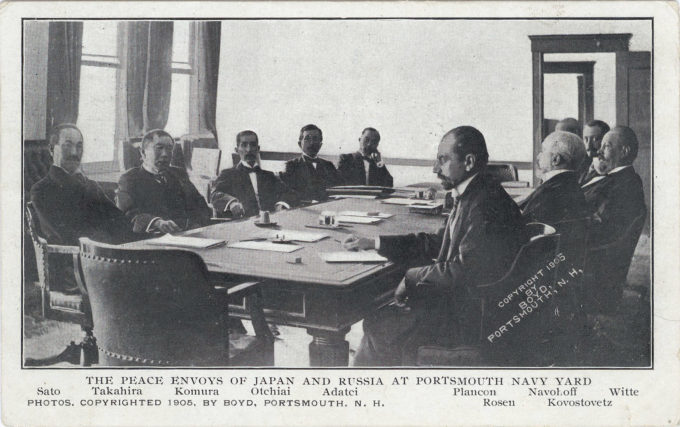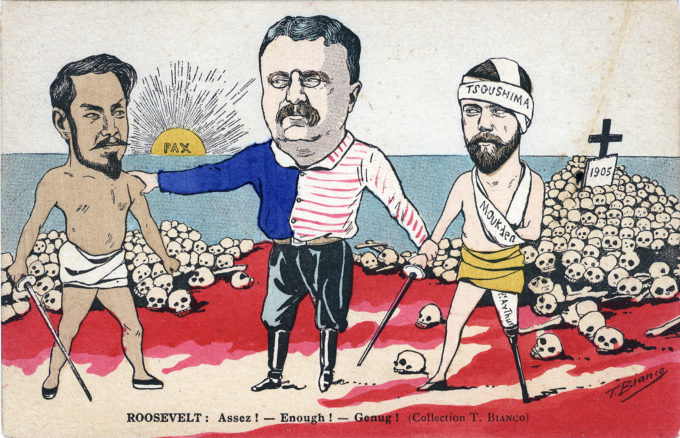
“The peace envoys of Japan and Russia at Portsmouth Navy Yard”, 1905. The Japanese delegation was led by Foreign Minister Komura Jutarō; the Russian delegation led by former Finance Minister Sergei Witte. Negotiations between the two countries began August 9, 1905, with U.S. President Theodore Roosevelt acting as the organizer and the mediator, a role for which he would subsequently win the Nobel Peace Prize, and concluded on August 30, with the Treaty of Portsmouth formally signed on September 5, 1905.
See also:
Russo-Japanese War (1904-1905).
Battle of Tsushima Straits propaganda postcard, Russo-Japanese War, 1905.
“Monument of [Hill] 203”, Port Arthur, Manchuria, c. 1910.
“By 1904, Russia and Japan had endured several years of disputes over control of Manchuria. The Russians had entered the region during the Sino-Japanese War of 1894–95 and, along with Germany and France, was a part of the ‘Triple Intervention” that forced Japan to give up its demands for ports in South Manchuria and the Liaodong Peninsula in the wake of its victory in China.
“Instead, Russia moved into the area and took control of Port Arthur, a warm water port with strategic and commercial significance. A Japanese attempt to stage a coup in adjacent Korea was thwarted in part by the Russian presence in the region, and the two nations’ divergent interests appeared more and more likely to clash.
“In 1904, the Japanese attacked the Russian fleet at Port Arthur … surprising the Russian navy and earning an early victory. Over the course of the next year, the two forces clashed in Korea and the Sea of Japan, with the Japanese scoring significant, but costly, victories.
“War casualties were high on both sides. At the battle over Mukden, the Russians lost 60,000 soldiers and the Japanese lost 41,000 soldiers. The military costs were high as well. A Russian fleet made the long trip from the Baltic Sea around Africa and India, only to be half destroyed by the Japanese upon its arrival in Northeast Asia. By 1905, the combination of these losses and the economic cost of financing the war led both countries to seek an end to the war.
“The Japanese asked U.S. President Roosevelt to negotiate a peace agreement, and representatives of the two nations met in Portsmouth, New Hampshire in 1905. For the sake of maintaining the balance of power and equal economic opportunity in the region, Roosevelt preferred that the war end on terms that left both Russia and Japan a role to play in Northeast China.
“… The Treaty [of Portsmouth] ultimately gave Japan control of Korea and much of South Manchuria, including Port Arthur and the railway that connected it with the rest of the region, along with the southern half of Sakhalin Island; Russian power was curtailed in the region, but it was not required to pay Japan’s war costs.
“Because neither nation was in a strong financial position to continue the war easily, both were forced to compromise in the terms of the peace. Still, the Japanese public felt they had won the war, and they considered the lack of an indemnity to be an affront.
“There was a brief outbreak of protests and rioting in Tokyo when the terms of the agreement were made public. Similarly, the Russian people were also dissatisfied, angry about giving up half of Sakhalin.”
– The Treaty of Portsmouth and the Russo-Japanese War, 1904–1905, Office of the Historian, Foreign Service Institute, United States Department of State, undated

“Assez! Enough! Genug!”, political cartoon, 1905. U.S. President Theodore Roosevelt steps between the “fighting” Emperor Meiji of Japan and Tsar Nicholas II of Russia, with a pax (“peace”) sun rising. Roosevelt served as the mediator of the negotiations organized in Portsmouth, N.H., ending the war the Russo-Japanese War. Roosevelt would go on the win the Nobel Peace Prize for this effort.
(Telegram sent by President Roosevelt to Secretary of War Taft)
Glenwood Springs, Colorado
April 20, 1905
Hon. WM. H. TAFT, Secretary of War,
Washington, D. C.
In the Japanese matter inform the Japanese Minister that, as matters are at present, it seems to me distinctly best that there should be direct negotiations between the Japanese and the Russian governments regarding all the terms of peace.As to what those terms should be, neither I nor anyone else can at the moment definitely advise; but I am clear that at the present time the negotiations should be directly between Russia and Japan and should include all the possible terms of peace; it being of course understood that Japan is adhering to her position of maintaining the Open Door in Manchuria and of restoring it to China.
(signed) THEODORE ROOSEVELT
– Roosevelt and the Russo-Japanese War: a critical study of American policy in Eastern Asia in 1902-5, by Tyler Dennett, 1925


Pingback: “In commemoration of the Establishment of Direct Cable Communication between Japan and America” commemorative postcards, 1906. | Old TokyoOld Tokyo